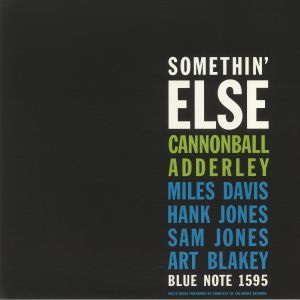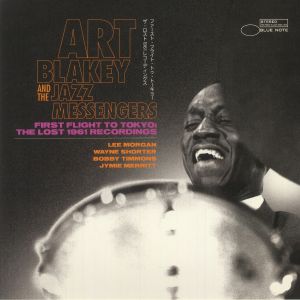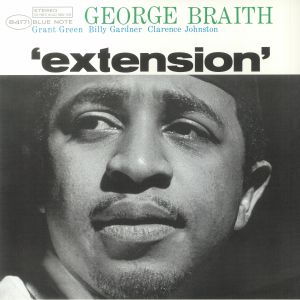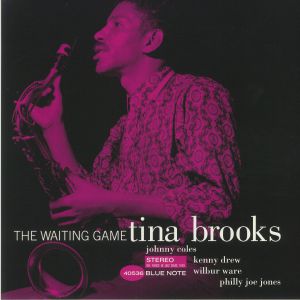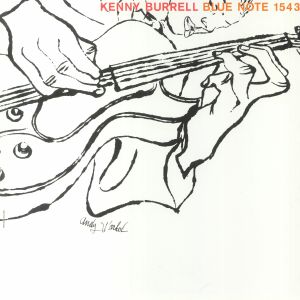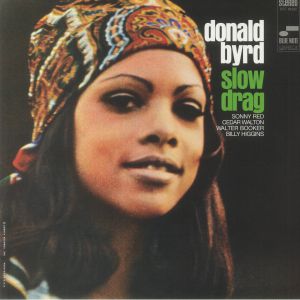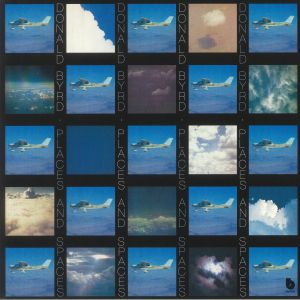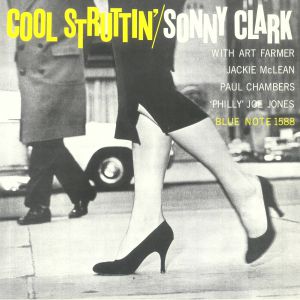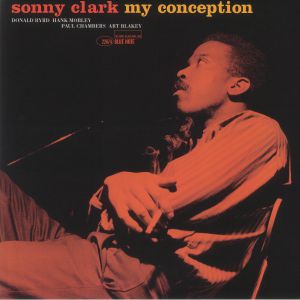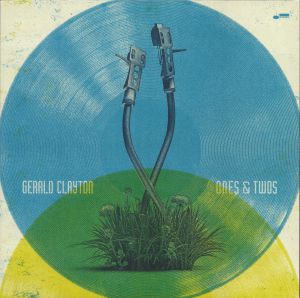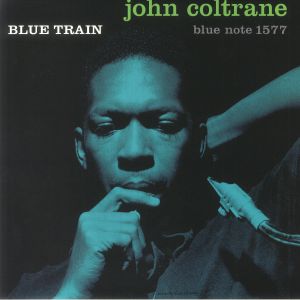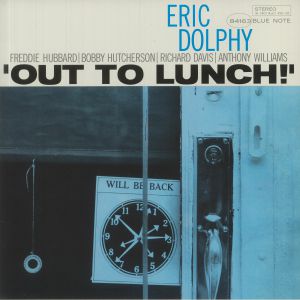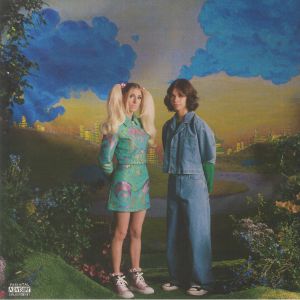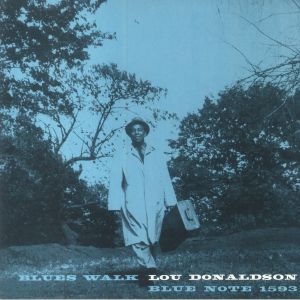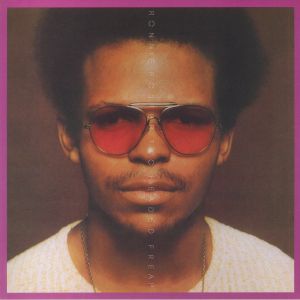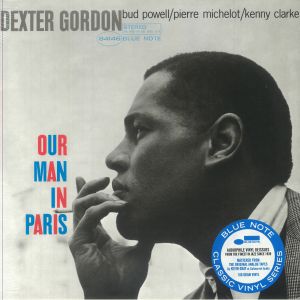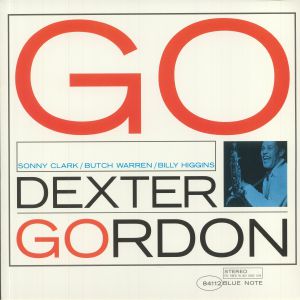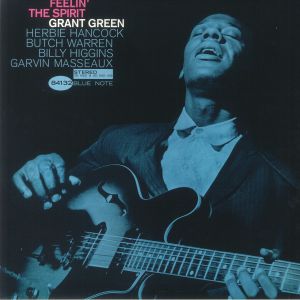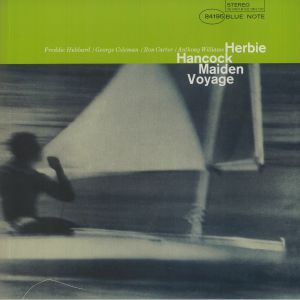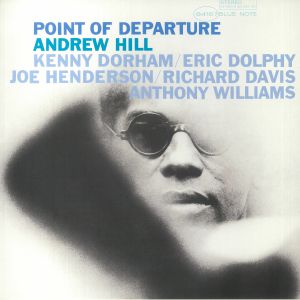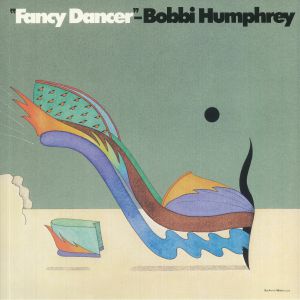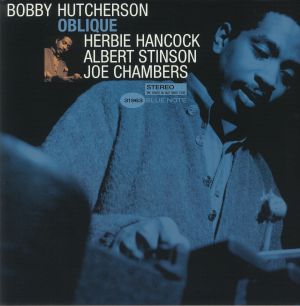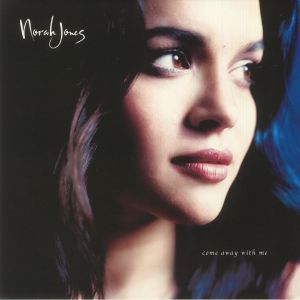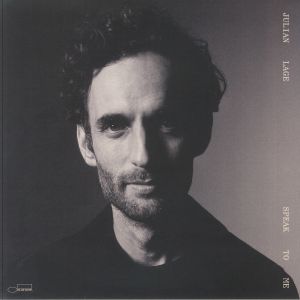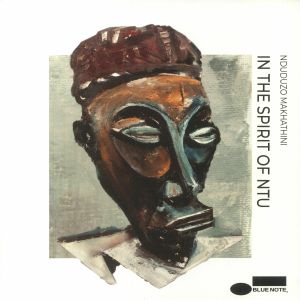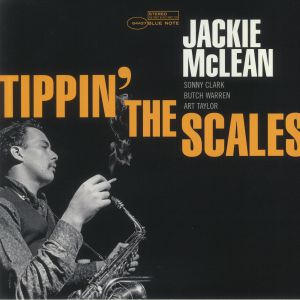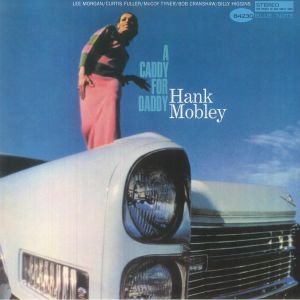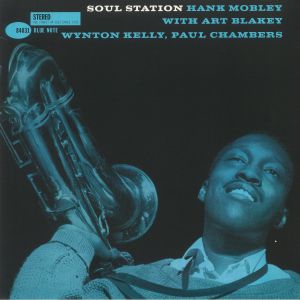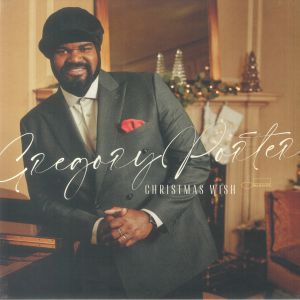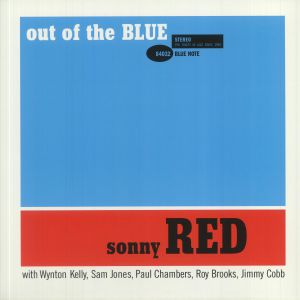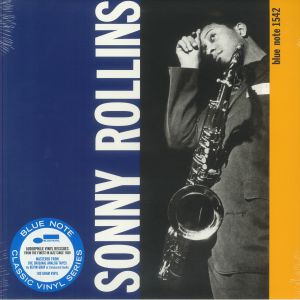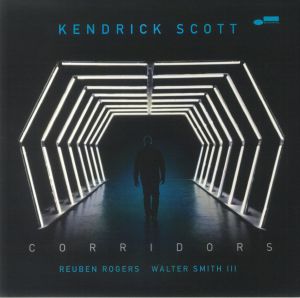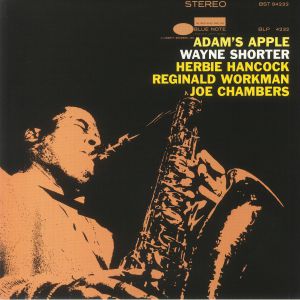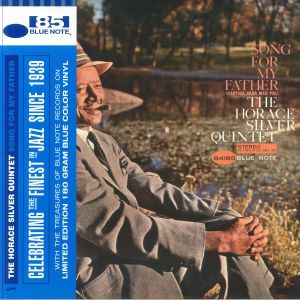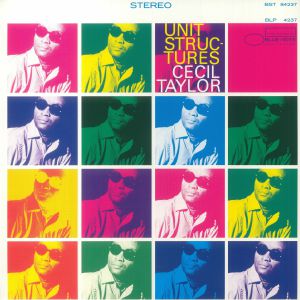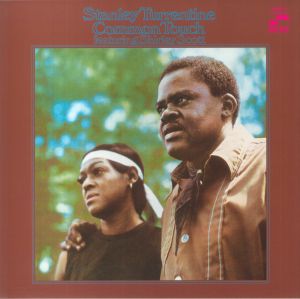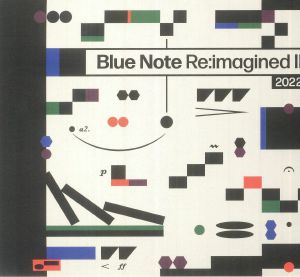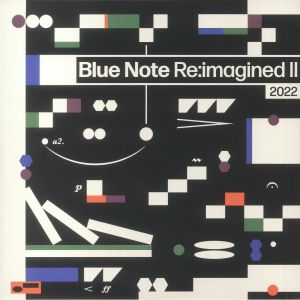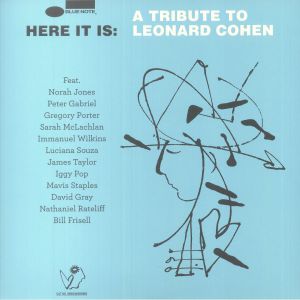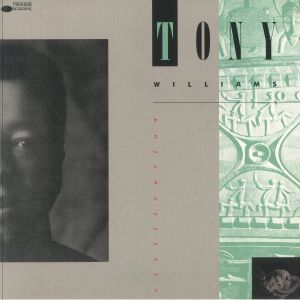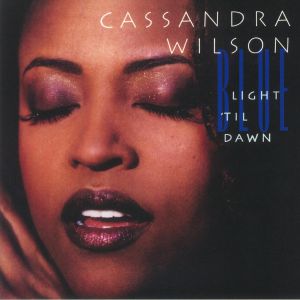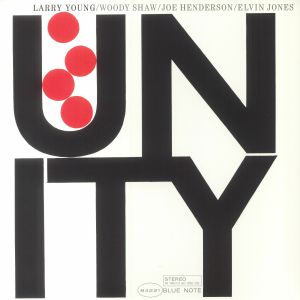Receive new release alerts for Blue Note
Filter
Artist
Featured
Release Title
Price
Blue Note Vinyl & CDs
Browse the latest Vinyl & CD releases on Blue NoteSimilar labels:
Items 1 to 43 of 43 on page 1 of 1
Review: Cannonball Adderley Somethin' Else gets the Tone Poet audiophile treatment now on this latest reissue from Blue Note. With the help of standout additional artists Miles Davis, Art Blakey, Hank Jones and Sam Jones, this is a record with a deep musical heritage and plenty of fine moments. The include the stunning performance of 'Autumn Leaves' and a fine title track along with the more romantic, slow shuffling and late night cuddliness of 'Dancing In The Dark.' Mastered by Kevin Gray from original master tapes and pressed to 180g vinyl, this is a must buy for jazz fans.
… Read more in stock $26.27
First Flight To Tokyo: The Lost 1961 Recordings (limited gatefold 180 gram vinyl 2xLP + booklet + postcards)
Cat: 359528 6. Rel: 10 Dec 21
Jazz
Review: First Flight to Tokyo: The Lost 1961 Recordings is sure to be a real thrill for fans of Art Blakey and his Jazz Messengers. It is a never before rebased or heard recording of a show they played at Hibiya Public Hall in Tokyo on January 14, 1961. The group was one of the first to tour the country and enthralled caudices everywhere they played. At the time, the band was made up of Lee Morgan on trumpet, Wayne Shorter on tenor sax, Bobby Timmons on piano and Jymie Merritt on bass and for this set they performed plenty of classics such as Charlie Parker's 'Now's the Time' and Thelonious Monk's 'Round About Midnight.'
… Read more in stock $47.55
Review: Extension was the last of three unique Blue Note sessions led by the singular saxophonist George Braith in the early 1960s. The album was rooted in soul jazz - with Grant Green (guitar), Billy Gardner (organ), and Clarence Johnston (drums) - but Braith's adventurous spirit led the music into unexpected realms on memorable originals like "Nut City." Blue Note Classic Vinyl Series is all-analogue, mastered by Kevin Gray from the original master tapes, and pressed on 180-gram vinyl at Optimal.
… Read morePlayed by: Juno Recommends Jazz
in stock $12.45
The Waiting Game (Tone Poet Series) (reissue) (gatefold 180 gram audiophile vinyl LP)
Cat: 893419. Rel: 29 Jan 21
Jazz
Review: Tina Brooks' final album was one of his most underrated. The tenor saxophonist really brought the goodness on The Waiting Game, which she record din 1961 but did not put out until 1999. The undervalued player might have played a big part in the hard bop era but only one of his Blue Note sessions ever made it out. Here he is joined by Johnny Coles on trumpet, Kenny Drew on piano, Wilbur Ware on bass, and Philly Joe Jones on drums, and wrote five of the six tunes himself. It's a soulful sound with highlights like modal masterpieces 'Dhyana' and 'David the King.'
… Read morePlayed by: Juno Recommends Jazz
in stock $45.34
Kenny Burrell (Tone Poet Series) (mono) (limited gatefold 180 gram audiophile vinyl LP)
Cat: B 003348601. Rel: 06 Oct 22
Jazz
Review: The Tone Poet series from Blue Note continues apace with this reissue of Kenny Burrell's masterful self-titled album. As guitarists go, Burrell has a sound which dances with nimble eloquence few could even dream of matching. Hear him cavorting across 'Be Happy' and it's quite hard to imagine the notes were played by human hands. Despite that, it's also a wonderfully delicate, rounded sound which more than makes it worthy of an entry into this series - just marvel at that tone, captured across a variety of spots in New York in the spring of '56.
… Read morePlayed by: Juno Recommends Jazz
in stock $33.17
Slow Drag (reissue) (gatefold 180 gram audiophile vinyl LP + insert)
Cat: BLUNB 0034364011. Rel: 01 Jun 23
Jazz
Review: Donald Byrd's 1967 Slow Drag album came after the jazz legend had already recorded more than dozen albums for the seminal Blue Note label. He was joined for it by the drumming of Billy Higgins, alto saxophonist Sonny Red, pianist Cedar Walton, and bassist Walter Booker who all bring their own original compositions to the album. It's a pure hard bop session that marked the end of this chapter of Byrd's sound before he moved into fusion territory. Plenty of edgy groove-fess, ad-libbed vocals and boss flavours feature on what is one of many Byrd essentials.
… Read more in stock $34.56
Review: Blue Note are on a reissuing roll, not shying from revisiting the work of their most treasured jazz acts this year. The latest in their Classic Editions comes by way of Donald Byrd, whose timeless 1975 album Places And Spaces documents the trumpeter's fearless jazz-funk fusion era. This being Blue Note, you can expect only the best rendition of this orchestral jazz-funk suite that a vinyl pressing has to offer. This version is an all-analog remaster, by legendary cutting engineer Kevin Gray, from the original tapes. Expect a thorough justice-doing of the hits, 'Dominoes' and 'Wind Parade', which boast production credits from the infamous Larry Mizell.
… Read more in stock $31.80
Review: Sonny Clark's Cool Struttin' album is a jazz classic. The artist himself shone bright for a brief but intense period of creativity, much like greats before him such as Charlie Parker and Fats Navarro. His intricate playing and hard swing mentality makes for music filled with nuance and detail but sadly he never got the recognition he deserved during his short life (he died aged 31). He put out seven records in all on Blue Note and played with the likes of John Coltrane and Donald Byrd. This memorable session was recorded by Rudy Van Gelder and features a quintet made up of altoist Jackie McLean, trumpeter Art Farmer, bassist Paul Chambers and drummer Philly Joe Jones.
… Read morePlayed by: Juno Recommends Jazz
in stock $22.11
My Conception (Tone Poet Series) (gatefold 180 gram audiophile vinyl LP)
Cat: 352682 4. Rel: 27 Aug 21
Jazz
Review: Sonny Clark was a truly elegant pianist who played with his own style of soul. On his My Conception full length he really reached the peak of his powers and for that reason it is the next in the on going Tone Poet reissue series by Blue Note. A big casts of sidemen feature on the record next to Clark including Hank Mobley on tenor saxophone, Donald Byrd on trumpet, Paul Chambers on bass and Art Blakey on drums. The record is packed with highlights such as the sombre trumpet of the title track and the fiery brilliance of 'Minor Meeting.'
… Read morePlayed by: Juno Recommends Jazz
in stock $40.65
Review: Dutch-born American jazz pianist and composer Gerald Clayton is back with a sixth album, his second on Blue Note. Ones & Twos is another exploration of jazz, hip-hop, neo-soul and raw improvisation that is all rooted in a deep conceptual framework. Featuring standout collaborators like Joel Ross, Elena Pinderhughes, Kendrick Scott and Kassa Overall, the album moves effortlessly from groove to abstraction and is inspired by turntablism, which is why Clayton created two sets of tracks that can play individually or simultaneously, blurring the line between harmony and dissonance. As rich as the sonics are, there is also real philosophical intent here, making it both a visceral and cerebral listen with layered commentary on collaboration, coexistence and creativity.
… Read morePlayed by: Juno Recommends Jazz
in stock $29.85
Blue Train (Tone Poet Series) (mono) (gatefold 180 gram audiophile vinyl LP)
Cat: 454810 5. Rel: 16 Sep 22
Jazz
Review: All aboard the blue 'Trane! one of the many albums that cemented Blue Note and John Coltrane's longstanding working relationship, 'Blue Train' is the saxophonist's second studio album and the only recording with Coltrane taking the role of bandleader. This version comes with several alternate, false starts and incomplete takes, owing to the single-take tradition of jazz recording back in the late 1950s.
… Read more in stock $43.12
Review: Jazz multi-instrumentalist Eric Dolphy's Out To Lunch is the latest in the on going Blue Note Reissue series, Tone Poet. It was his only recording for the seminal label and is often said to be one of the best they ever put out, as well as one of Dolphy's own personal highlights. Certainly fans of 1960s avant-garde jazz will agree. Dolphy was joined by trumpeter Freddie Hubbard and bassist Richard Davis amongst others, and told all players that there was no leader in the recording sessions that made up the album. That makes for a dense, busy and freeform record filled with wild playing and super musical ideas.
… Read morePlayed by: Juno Recommends Jazz
in stock $26.27
Review: Domi and JD Beck are already taking the world by storm - just clock the irreverent but oh-so-sweet video to 'Smile', directed by Anderson .Paak and featuring cameos from the likes of Thundercat. The duo met by chance jamming at a NAMM convention and soon struck upon a partnership which took their serious musical skills and injected them with the kind of flippant, fun-seeking attitude that breathes new life into traditional music. They've sat in with Herbie Hancock and backed Ariana Grande, Mac Demarco and more, and now their debut album lands on Paak's Apeshit label in conjunction with Blue Note. Not Tight is cool down to the very last drop, but crucially it doesn't take itself too seriously. Domi and Beck know they've got the skills, and you can tell they're having an absolute blast messing with the jazz rulebook while delivering some impossibly sweet grooves.
… Read more in stock $33.46
Blues Walk (Classic Vinyl Series) (remastered) (180 gram audiophile vinyl LP)
Cat: 453520 8. Rel: 17 Jun 22
Jazz
Review: Blue Note Records continue to top up their Classic Vinyl reissues series, this time homing in on Lou Donaldson's sixth album for the label 'Blues Walk' (he never swayed from Blue Note). The legendary jazz saxophonist and bandleader intended the LP to be his magnum opus at the time, and as history slowly ingested its influence, it became as such. Six rain-drizzled original pieces span two sides, with Donaldson joined by Herman Foster, Peck Morrison, Dave Bailey and Ray Barretto for an unusual jazz combo involving congas, and a unique mood that epitomised his own brand of cool jazz-blues.
… Read morePlayed by: Juno Recommends Jazz
in stock $28.20
Two Headed Freap (Classic Vinyl Series) (remastered) (limited 180 gram audiophile vinyl LP)
Cat: 453520 3. Rel: 27 May 22
Jazz
Review: The vast and ongoing Blue Note reissue series continues apace her with organist Ronnie Foster's Two Headed Freep album. Foster was a master collaborator who worked with everyone from George Benson to the Jacksons to Stevie Wonder (an in fact played the keys on Songs In The Key Of Life.) But it was his work on Grant Green's funky live LP Alive! in 1970 that caught the attention of the Blue Note boss who tapped him up for this label debut two years later. It is a vibrant seton tunes with five originals as well as covers of the likes of Al Green. Kevin Gray has mastered it from the original tapes and it has been pressed on 180g vinyl at Optimal.
… Read more in stock $36.22
Our Man In Paris (Classic Vinyl Series) (180 gram audiophile vinyl LP)
Cat: 651496 7. Rel: 20 Feb 25
Jazz
Review: Super cool jazz cat Dexter Gordon's 1963 album Our Man in Paris marked his first release from Europe and is often regarded as the final bebop album. The saxophonist gathered a quartet featuring bebop legends Bud Powell on piano and Kenny Clarke on drums and they played alongside French bassist Pierre Michelot to record this timeless work at CBS Studios in Paris. The album is defined by Gordon's commanding saxophone with the intricate rhythms of bebop that take you right back to a precise moment of musical history which marked a significant transition in jazz. It remained a defining work in Gordon's career.
… Read morePlayed by: Juno Recommends Jazz
in stock $30.96
Review: American jazz tenor saxophonist Dexter Gordon was one of the most influential early bebop musicians alongside the likes of Dizzy Gillespie and Charlie Parker. His 1962 album Go on Blue Note was not actually recorded in a club, but in a fashion in the studio that replicated that informal environment. The legendary Rudy Van Gelder oversaw proceedings at his Van Gelder Studio and had Sonny Clark on piano, Butch Warren on Bass and Billy Higgins on drums. Next to tunes Dexter wrote himself are covers of Cole Porter's 'Love For Sale' amongst other highlights.
… Read more in stock $24.06
Feelin' The Spirit (Tone Poet Series) (remastered) (limited gatefold 180 gram audiophile vinyl LP)
Cat: B 003348801. Rel: 06 Oct 22
Jazz
Review: Blue Note's Tone Poets series is all about celebrating some of the greatest jazz guitarists, reissuing their seminal albums as a nod to virtuoso talent. Grant Green's 1963 album Feelin' The Spirit consisted of jazz arrangements of traditional African American spirituals such as 'Nobody Knows The Trouble I've Seen' and 'Sometimes I Feel Like A Motherless Child'. Given the historical weight of the music, it's no surprise to hear Green soaring high as he expresses the songs through his guitar, but as if that wasn't enough he's backed up by Herbie Hancock on piano, Butch Warren on bass and Billy Higgins on drums.
… Read morePlayed by: Charlie bucket/ dancing in space
in stock $42.31
Maiden Voyage (Classic Vinyl Series) (limited 180 gram audiophile vinyl LP)
Cat: 359319 6. Rel: 24 Sep 21
Jazz
Review: Blue Note's Classic Vinyl series is about reissuing vital jazz records on heavyweight vinyl with all new mastering by Kevin Gray of Coherant Audio. Next to get the special treatment it deserves is Herbie Hancock's 1965 classic Maiden Voyage, which is some of the most evocative jazz to have ever been recorded. Net to Hancock, the players were all either present or past members of Miles Davis' quintet, so made for a heavy line-up. Hancock's impressionistic style is here for all to hear with the sublime compositions of 'Dolphin's Dance' and 'Maiden Voyage' and more tumultuous sounds of 'The Eye Of The Hurricane' some of the highlights.
… Read morePlayed by: Juno Recommends Jazz, DJ ROCCA
in stock $26.27
Review: American jazz pianist and composer Andrew Hill originally released his Point of Departure album in 1965 on the Blue Note label. He found him playing in a sextet alongside the talented likes of alto saxophonists Eric Dolphy and Joe Henderson plus trumpeter Kenny Dorham and drummer Tony Williams as well as bassist Richard Davis. The record was remastered for a CD release in 1999 by the legendary Rudy Van Gelder and even now it stands apart as a future jazz statement. Some of the tracks are heavy on melancholy to the point that Dorham would occasionally tear up when playing them live.
… Read more in stock $31.52
Review: American Bobbi Humphrey is one of the most well loved jazz flautists. She turned out plenty of vibrant albums, none less so than this, Fancy Dancer, which was her fifth. It came on Blue Note in 1975 and is full of all killer no filler gold. It also saw her, along with producers the Mizell Brothers aka Larry and Fonce, come up with a fresh new largely instrumental funk sound. Weaving in everything from world music to soul-jazz to club music to pop, it's a widescreen sound that is packed with uplifting flute from Humphrey and lush production that reveals something new with each listen.
… Read more in stock $27.92
Review: The most celebrated jazz vibraphonist of them all is Bobby Hutcherson. Oblique was one of many high water marks of the Blue Note man, and it featured Herbie Hancock, Albert Stinson and Joe Chambers on the original session recorded in 1967. The album was only the second time Bobby played as part of a quartet and it received rave reviews at the time for its sophisticated but accessible sound. Laid back, lyrical and subdued in sound, the album touches on funky styles and jazz-rock influences with impeccable production from the legendary Rudy Van Gelder studio in New York.
… Read more in stock $42.31
Cat: 453823 6. Rel: 29 Sep 22
Broken Beat/Nu Jazz
Review: Oscar Jerome, Oscar Worldpeace and Franc Moody have got new music coming on the latest Blue Note Re:imagined compilation this year which is already getting us hella excited. Before we hear what is sure to be a contemporary great, we get treated to a couple of singles from it on this tidy 45 rpm. Jerome Oscar & Oscar Worldpeace go first with '(Why You So) Green With Envy' which fuses jazz styles for across the age with Worldpeace's tight and thoughtful bars. On the flip side is Franc Moody with 'Cristo Redentor' which balances jazz's traditional past with its freshest future.
… Read more in stock $10.51
Review: Norah Jones is one of the most prominent voices of her generation and this record is a perfectly soothing listen that works both in the background - because of its gentle nature - but also up close if you tune into the lyrics. Now 20 years old, it gets a special anniversary reissue having, over the years, reaches in number one in 20 countries around the world. It sold almost 30 million copies and picked up all manner of awards. A real modern gem.
… Read more! low stock $30.42
Review: Guitar virtuoso Julian Lage's Speak To Me is a dynamic Blue Note album produced by Joe Henry. Arriving with 13 original tracks, Lage's compositions navigate a rich tapestry of American music genres, from gospel hymns to California singer-songwriter vibes and skronky jazz. The album's lead single '76' showcases a hard-driving blues essence, while 'As It Were' offers an atmospheric acoustic ballad. With contributions from Kris Davis, Patrick Warren, Levon Henry, and his trusted trio with bassist Jorge Roeder and drummer Dave King, Lage presents a multifaceted musical journey that captivates and enthrals in equal measure here.
… Read more in stock $42.31
Review: Blue Note Records has joined forces with Universal Music Group Africa for a series of special albums, and this is Makhathini's second. In the Spirit of Ntu is his tenth album in all and a real landmark from the visionary pianist, healer, composer and improviser. All of his many themes and conceptual notions get distilled into a comprehensive yet accessible 10-track record with nods to John Coltrane and Abdullah Ibrahim amongst others, but also cultural references to the sounds of the South African landscape. Many of the country's most talented young musicians play on the record including saxophonist Linda Sikhakhane, trumpeter Robin Fassie Kock and vibraphonist Dylan Tabisher.
… Read morePlayed by: AfroBase (Radio Chart)
in stock $39.03
Tippin' The Scales (Tone Poet Series) (gatefold 180 gram audiophile vinyl LP)
Cat: 355197 5. Rel: 05 Apr 22
Jazz
Review: American alto talent Jackie McLean released his Tippin The Scales album in 1979 on the legendary Blue Note. It was a post bob record that has rather remained under the radar in the years since, but will still cost you a pretty penny if you can find a second hand copy. The Tone Poet serve brings it back to the fore with a deluxe reissue package that allows the tunes to really shine. Jackie wrote two of them while Sonny Clark write three and one is a J. Latouche and V. Duke collaboration. The record was recorded on September 28, 1962 and is one of the more traditional records in McLean's oeuvre.
… Read morePlayed by: Juno Recommends Jazz
in stock $38.99
A Caddy For Daddy (Blue Note Tone Poet Series) (gatefold 180 gram audiophile vinyl LP)
Cat: 389636 2. Rel: 06 Jul 23
Jazz
Review: Few jazz saxophonists were as majestic as Hank Mobley. He had a unique sound that sat in between the rawness of John Coltrane and the smoothness of Stan Getz and released a number of now-classic albums. Soul Station has already had the Tone Poet Series treatment and next up to get remastered and come on new audiophile vinyl is A Caddy For Daddy. He had already been a But Note artist for some 10 years when he recorded this one in 1965. It finds him alongside a first-class sextet with Lee Morgan on trumpet, Bob Cranshaw on bass, McCoy Tyner on piano, Billy Higgins on drums and Curtis Fuller on trombone.
… Read morePlayed by: Juno Recommends Jazz, DJ ROCCA
in stock $40.92
Review: Blue Jazz's on going Tone Poet Series - which is about reissuing classic jazz on heavyweight, audiophile quality vinyl - throws out another gem here with the Hank Mobley classic Soul Station. Hank started out as a pianist before moving to the tenor sax aged 16. He put plenty of emotion and intensity into every note he played and during the years 1955-1970 he fronted more than 25 Blue Note albums as well as being a sideman on many others. This record captures him at the peak of his powers with a lyrical playing style and length, passionate solos.
… Read morePlayed by: Juno Recommends Jazz
in stock $29.85
Review: Ella Fitzgerald has a spotless discography that is packed with many a classic tunes but for plenty of fans and critics alike, Let No Man Write My Epitaph is one of her ultimate standouts. She recorded the album back in 1960 with backing from the pianist Paul Smith. The album takes its name from the movie in which Fitzgerald starred and hits some truly rare depth of emotional understanding. It helped secure Ella's status as one of the finest translators of the Great American Songbook and now Verve's Acoustic Sounds Series transfers the originals from analog tapes and has remastered them on to 180-gram vinyl complete with deluxe gatefold packaging.
… Read more in stock $30.42
Out Of The Blue (Tone Poet Series) (limited gatefold 180 gram audiophile vinyl LP)
Cat: 353818 9. Rel: 01 Apr 22
Jazz
Review: Even though it came on the venerated Blue Note label, Sonny Red's Out of the Blue record is somehow something of an overlooked treasure. Alto sax man Sonny Red only out this one record for the label and recorded it across two separate sessions with piano from Wynton Kelly as well as Sam Jones and Paul Chambers on bass, stickmen Roy Brooks and Jimmy Cobb. This reissue is part of the Tone Poet Series which presses up records on nice heavy wax in deluxe packaging after remastering form the original analogue master tapes so you can be sure it sounds superb.
… Read morePlayed by: Juno Recommends Jazz
in stock $35.12
Review: Sonny Rollins made his Blue Note debut in 1949 with Bud Powell, but returned as a leader in 1956 with Volume 1. This album showcases classic Rollins so has plenty of hard-swinging originals and a tender ballad that perfectly offer up his powerful sound and boundless improvisational skills. The quintet includes Donald Byrd, Wynton Kelly, Gene Ramey and Max Roach who all support Rollins in creating a dynamic blend of jazz. This record solidified Rollins' reputation as a leading figure in the genre, and that is still true to this day.
… Read morePlayed by: Juno Recommends Jazz
in stock $30.96
Review: Kendrick Scott has been holding it down as a leading contemporary jazz drummer in the US for more than a decade, and he returns to Blue Note with a new album after 2019's knockout A Wall Becomes A Bridge. His innate sense of optimism comes through in the music, as he seeks on Corridors to highlight the things that connect us people sharing a world. It is of course a response to the isolation of the pandemic years, but also a deeper reflection on what it means to ride the wave. Working with a pared down trio featuring saxophonist Walter Smith III and bassist Reuben Rogers, the Hoston-based sticksman lays down another striking statement that builds on his ever-progressing legacy.
… Read more in stock $26.27
Review: Now more than 80 years old and onto its umpteenth reissue after the latest was a 75th anniversary edition in 2015, Wayne Shorter's Adam's Apple remains as classic as ever. This Classic Vinyl Series issue is all-analogue and mastered by Kevin Gray from the original master tapes then pressed on 180g vinyl. Next to sax from Wayne himself, Herbie Hancock, Reggie Workman and Joe Chambers joined the ranks to help cook up these serious grooving and cool-cat tunes. It was originally released in 1966 and still stands out as one of his greatest ever albums.
… Read morePlayed by: Juno Recommends Jazz
in stock $30.96
Song For My Father (reissue) (limited 180 gram blue vinyl LP with obi-strip (indie exclusive))
Cat: 651173 2. Rel: 12 Sep 24
Jazz
Review: A decade into his career, Horace Silver recorded what many consider one of his finest albums at the renowned Van Gelder Studio. Joined by Blue Mitchell, Junior Cook, Gene Taylor, and Roy Brooks, the session marked a key transition for his quintet. This album was released a year before his iconic hit 'Song for My Father,' which was indeed a tribute to his Cape Verdean father. This reissue for the Blue Note Classic series has been remastered by Kevin Gray from the original master tapes so it offers an all-analogue experience and delivers superb sound quality that honours Silver's legacy.
… Read more in stock $39.54
Review: Cecil Taylor released Unit Structures on the Blue Note label in 1966. It was his debut on the label and was quickly followed up by a second album in the same year with Conquistador! This one came with an essay by Taylor entitled Sound Structure of Subculture Becoming Major Breath/Naked Fire Gesture and is known for its high energy and atonal sounds. It sat well within the plasm of the free-jazz of the times but was at the sharp end with its ferocious paying styles. It is a record rich on colour and mathematical complexity with two bassists adding their own low end weight.
… Read more in stock $28.20
Played by: Juno Recommends Jazz
in stock $29.85
Review: The first Blue Note Re:imagined album was frankly brilliant - an imaginative, inspired and thoroughly brilliant set of covers of classic cuts from the label's catalogue, expertly realised by a cast of 21st century UK jazz and soul talents - so hopes are naturally high for this sequel. We shouldn't have worried, to be honest, because it's another terrific collection. Our picks of a very strong bunch include Swindle's orchestra-sporting, jazz-funk-goes-hip-hop-soul take on Donald Byrd's 'Miss Kane', Ego Ella May's gently dubby, head-nodding and sunrise-ready re-imagining of Chico Hamilton's 'The Morning Side of Love', an ultra-dreamy, pedal steel-sporting cover of 'Harvest Moon' courtesy of Maya Delilah, and a tactile neo-soul interpretation of Marlena Shaw classic 'Feel Like Making Love' by Kay Young. Impeccable.
… Read more in stock $13.55
Review: You may have caught the striking quality of Ego Ella May and Theon Cross' lead single for Blue Note Re:imagined II, and now the full compilation has arrived. For such a long-standing, heritage label, Blue Note have recognised the renewed moment jazz is having and responded with an exciting look into those artists forging new paths. Given the importance of tradition and roots within jazz, it's fascinating to see how a new generation tackle totemic works from Blue Note's gargantuan history. From Nubiyan Twist to Conor Albert, Maya Delilah to Reuben James, the featured artists serve as a crucial primer of what's good in jazz right now, and the hit rate is high from start to finish.
… Read more in stock $26.27
VARIOUS
Here It Is: A Tribute To Leonard Cohen (gatefold 2xLP)
Cat: 0060244 5659968. Rel: 03 Nov 22
Rock
Review: The legend Leonard Cohen was already sure to live on but this new collection of renditions of the legendary singer-songwriter's many and most profound songs makes it a dead cert. Produced by Larry Klein it is a remarkable record that features a truly broad array of artists, all legends in their own right, from jazz crooner Gregory Porter to post-punk poster child Iggy Pop via pop star David Gray and the always soothing sounds of Norah Jones. Sarah McLachlan's version of the iconic 'Hallelujah' is a real standout while Luciana Souza's 'Hey, That's No Way To Say Goodbye' is also a fine reworking.
… Read more in stock $30.70
Review: American jazz drummer Tony Williams rose to acclaim as a member of Miles Davis' so-called 'Second Great Quintet'. He later went on to pioneer jazz fusion with the group and formed his own outfit, the Tony Williams Lifetime. In 1986 he released 'Civilization', which marked a triumphant return to Blue Note and a great window into his visionary approach to jazz. Leading a stellar acoustic quintet with Wallace Roney (trumpet), Billy Pierce (sax), Mulgrew Miller (piano) and Charnett Moffett (bass), Williams served up a dynamic set of original compositions that pulse with intensity and technical brilliance, as well as emotional depth, while taking post-bop tradition into new relays. Each player brings sharp improvisational insight, but it's Williams' explosive yet precise drumming that anchors the session.
… Read more in stock $29.85
Blue Light 'Til Dawn (Classic Vinyl Series) (reissue) (limited gatefold 180 gram vinyl 2xLP)
Cat: 387619 0. Rel: 15 Apr 22
Blues
Review: Cassandra Wilson originally released Blue Light 'til Dawn in 1993 on Blue Note. Gathering together selected covers of blues and rock classics, Wilson and her band turn them to sultry, smoky jazz pieces with an evocative, late-night mood. From Robert Johnson and Joni Mitchell to Ann Peebles and Van Morrison, there are some heavy hitters covered here, but don't overlook the original title track. Amongst everything else it shows off Gib Wharton's stunning pedal steel guitar, which lends itself to this moody hue Wilson and her cohorts conjure so effectively.
… Read more in stock $50.87
Review: Larry Young was an American jazz organist, whose claim to fame lay in his use of the Hammond B3 organ in a genre context it wasn't regularly used for: post-bop. 'Unity' came out in 1965, and saw him collaborate with trumpeter Woody Shaw, saxophonist Joe Henderson, and drummer Elvin Jones. The aim was to transcend each artist's tendency towards individualism, producing a stunning mood piece that brought out the organ in a surreptitious yet noticeable context. Young's playing renders the instrument popping, bright and vibrant.
… Read morePlayed by: Juno Recommends Jazz
in stock $29.85
Items 1 to 43 of 43 on page 1 of 1

 USD
USD





